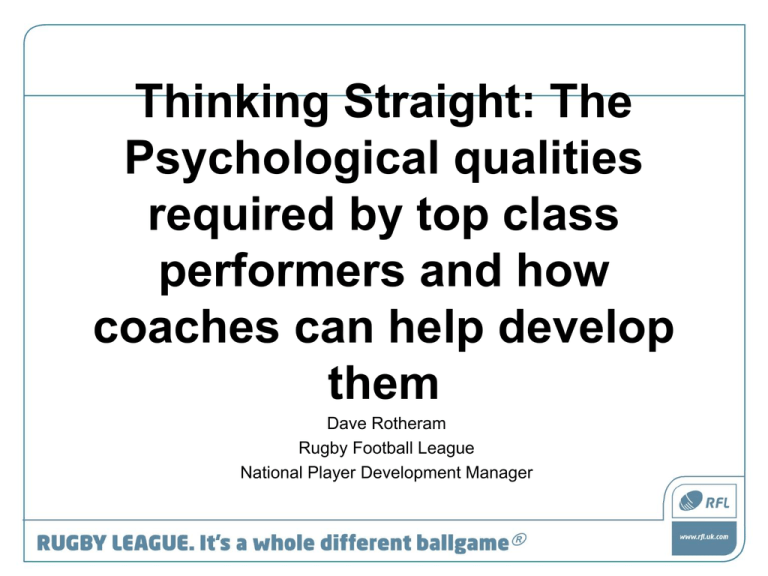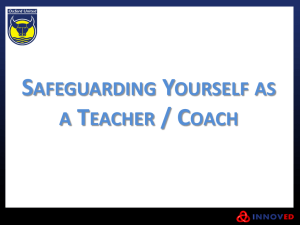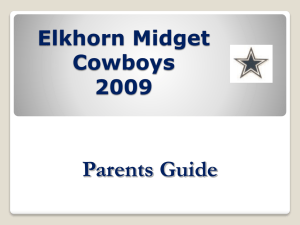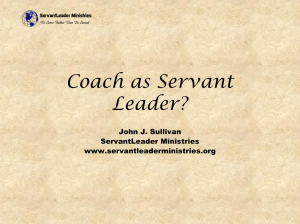Presentation: David Rotheram
advertisement

Thinking Straight: The Psychological qualities required by top class performers and how coaches can help develop them Dave Rotheram Rugby Football League National Player Development Manager HOW DO YOU START WITH THIS? AND TURN HIM INTO THIS? GOING FOR GOLD • 2012 clip.wmv SOME TALENT DEVELOPMENT SYSTEMS 10 Years or 10,000 Hours Ericsson 1996 Romance Phase Precision Phase Integration Phase Ericcson, Krampe & Tesch-Romer 1993 Long Term Athlete Development (LTAD) Late Specialisation model (team sports) Fundamental Learning to train Training to train Training to compete Training to win Retirement & Retraining Long Term Athlete Development (LTAD) Early Specialisation model (gymnastics) Training to train Training to compete Training to win Retirement & Retraining Gearing up for Performance (Balyi, 2004: Based upon Wenger, 2000) • WHAT DOES AN ELITE PLAYER LOOK LIKE? RUGBY LEAGUE PLAYER DEVELOPMENT FRAMEWORK 1. 2. 3. 4. 5. 6. Technical Tactical Movement Skills Athletic Development Lifestyle Psychological Development As a coach, how much time do we spend on each of the 6 areas? DEVELOPING PSYCHOLOGICAL QUALITIES How to apply in ALL environments SUPER LEAGUE & INTERNATIONAL COACHES 1. Attitude 2. Desire / Hungry 3. Self Belief / Confidence / Ego 4. Commitment 5. Consistency National Development Camp, 2008 6. Athletic Prowess 7. Mental Toughness 8. Technical Ability/Vision 9. Looking for the Challenge / Enthusiasm 10. Hard Work / Sacrifices Coach Perspective of Higher Performance in Youth Players RANK PERFORMANCE INDICATOR 1 Discipline (set goals, preparation) 2 Attitude (on/off field) 3 Character outside football (school, job, family) 4 Learning Ability 5 Personality (coachability) 6 Skill level 7 Ability to fit in at the club 8 Football ability (tactical awareness) 9 Body Shape (applying it, future growth) 10 Speed Adapted from Cupples & O’Connor (2011), NYC Under 20 Coaches “Cognitive indicators such as attitude, discipline, character, personality and learning ability were specified as crucial to reach the elite level. These identified factors reinforce the notion that physical talent alone does not guarantee success and that cognitive abilities influence the players “who get there” Cupples & O’Connor (2011) “DEVELOPMENT” COACHES QUOTES “There’s a belief where you’ve either got it or you haven’t mentally instead of an understanding that mental skills can be trained like physical skills.” “You can’t change your genetics, but you could change somebody’s attitude.” “It’s important to start the psychological stuff fairly young. But I’m not sure that that psychological stuff needs to be “lie on my couch” stuff, it’s more practical psychology.” Martindale et al, 2007 PSYCHOLOGICAL QUALITIES • Gould, Diffenbach & Moffett (2002) • Studied the Talent development of 10 USA Olympians, especially their psychological development CHAMPIONS CHARACTERISED BY • • • • • • • • Cope with and control anxiety Show self confidence Exhibit “mental toughness” Block out distractions Competitiveness Strong work ethic Set and achieve goals Coachability “Hence, they seemed to have developed mental skills that would prepare them for the long and difficult process necessary for developing their talent.” Gould, D., Dieffenbach, K. & Moffett, A. 2002, ‘Psychological characteristics and their development in Olympic champions’, Journal of Applied Sport Psychology, n.14, pp.172-204. CRUCIAL FOR EXCELLENCE • • • • • • • Effective and Controllable Imagery Focus & Distraction Control Realistic Performance Evaluation & Attribution Role Clarity & Commitment Planning & Organisation Goal Setting & Self-reinforcement Quality Practice Collins (2009) APPLICATION IN YOUR COACHING THE CHANCES ARE YOU’RE ALREADY DOING THIS!! 1. 2. 3. 4. 5. 6. 7. 8. 9. Commitment Effective & Controllable Imagery Focus & Distraction Control Realistic Performance Evaluation & Attribution Role Clarity Planning & Organisation Perceptions of Pressure Goal Setting & Self-reinforcement Quality Practice COMMITMENT PROMOTING SYSTEM COACH BEHAVIOUR INSIGHTS Players Attend regularly and communicate absences in advance of the session. Clear and communicated expectations for attendance and who to contact. Communicate expectations in advance Agree a process for non adherence of agreed expectations Provide contact details and appropriate method for communicating Acknowledge absences (players/staff) to the group Keep a register of attendance EFFECTIVE CONTROLABLE IMAGERY PROMOTING SYSTEM COACH BEHAVIOUR INSIGHTS When practicing a skill player’s mentally rehearse the skill before trying the skill. Raise awareness of the importance of imagery in improving a player’s game. Discrete activities set to encourage imagery Use questioning (how did that feel, what did you see/what did it look like, what did you hear) Use questioning which encourages the players to recall and use imagery Provide high quality demonstrations (coach, player & video) Regular opportunities to experience imagery in sessions and through individual challenges Use of role model footage PLANNING AND ORGANISATION PROMOTING SYSTEM COACH BEHAVIOUR INSIGHTS Players to consider their weekly routine around their game preparation. Reinforce the importance of having an established routine for game preparation. Provide examples of a weekly routine gradually increasing the commitment and consistency i.e. rest, recovery, nutrition, hydration and lifestyle choices Role model the behaviours expected as the coach Highlight good practice and use role model examples Acknowledge and accept ‘hot spots’ Demonstrate a wider interest in the players lives Communicate ‘hot spots’ in the schedule A 12 YEAR OLD....... I joined the swimming club… On the first day of swim practice, I was so inept I was put with the seven-yearolds. I looked around and saw the youngest sister of one of my friends. It was embarrassing. But I tried. If I had to swim the little kids to learn technique, then that’s what I was willing to do. My mother gets emotional to this day when she remembers how I leaped headfirst in the water and flailed up and down the length of the pool, as if I was trying to splash all the water out of it. “You tried so hard,” she says. I didn’t swim in the worst group for long. Within a year, … I was fourth in the state in the 1,500-meter freestyle. LANCE ARMSTRONG AND A 10 YEAR OLD...... “At ten years old I was the youngest and was a bit too small for the boat. …. I was frustrated when I came last or second last in most races as I imagined I would be able to get better results. On the journey home I decided I would never let this happen again. I wasn’t going to be last, no matter what it took.” ELLEN McARTHUR REFERENCES • Cupples B & O’Connor D (2011), The Development of Position-Specific Performance Indicators in Elite Youth Rugby League: A Coach’s Perspective • Gould D & Carson S (2004), Myths surrounding the role of youth sports in developing Olympic champions • Collins D (2009), Talent ID and Profiling • Martindale et al (2007), Effective Talent Development: The Elite Coach Perspective in UK Sport





